RIP Dame Tariana Turia
Reflections on the co-founder of Te Pāti Māori.
And when a child is born into this world
It has no concept
Of the tone of skin it's living in
And there's a million voices
And there's a million voices
To tell you what you should be thinking
Song by Neneh Cherry and Youssou N'Dour.
The moment you see that face, you can hear her voice; the phrase familiar, but the meaning different.
She would begin with “What I would say to you”, the same words that Christopher Luxon uses, but where you know he’ll follow it up with waffle, distraction, and pointing fingers elsewhere, with Tariana, what followed was both barrels - Blammo!
No shaking of your head, wondering what on earth the PM was trying to say, if indeed it was anything at all, but a very clear message beginning with an implied ‘sonny’, i.e. “What I would say to you, sonny…”
Sadly, Dame Turia and that memorable voice have now gone, yet there is no silence.
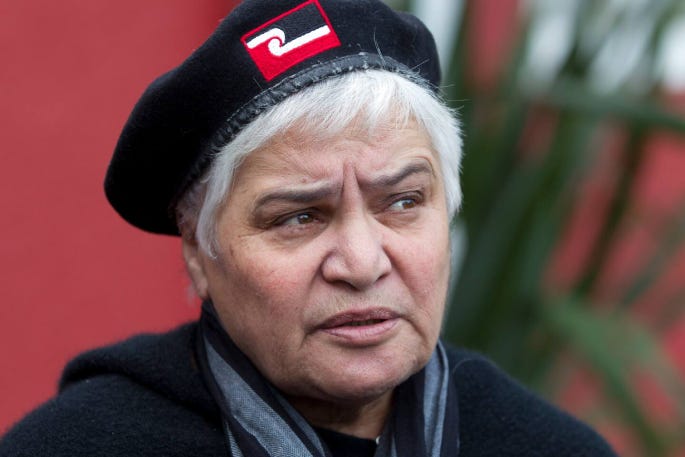
This year, you will hear her, like the far-off roar of waves upon a wild shore building, impossible to ignore. By Waitangi, they will be thundering, defiant voices, thousands in their number, backed by a political movement begun by Tariana.
I heard her voice last year, and although I am Pakeha, it sounded like home to me. At times, 2024 felt like the opening salvos in a civil war, one in which I had no difficulty picking sides.
I confess I have not always felt so enthusiastic about the political movement Tariana began, te Pāti Māori, but that is the past, and there are other things to speak of first.
The news came through on Thursday night that Turia had suffered a major stroke, and her time was near as whanau gathered around her and requested privacy. By yesterday morning, the news came through that this diminutive woman with such strength, who changed the face of politics in Aotearoa, had gone.
I never met Tariana in person, but I remember seeing her for the first time.
At the time, I was working for Datacom in Federal Street. We had car parks at Sky City, where I saw her that day and several times afterwards. This was back when she was the first Minister for Whānau Ora under the Key government. What struck me at the time was how ordinary and small she looked.
There she was, going the same way as me in the late afternoon, unaccompanied by security or staff, holding what looked to be a lot of paperwork as she worked her way up the hill. She didn’t look like a politician or someone considered “important”.
After hearing of her passing, I thought of what she and Pita Sharples achieved, the events of the time and their legacy today.
There were parallels to today, 21 years ago, back in 2004. In a way, the Foreshore and Seabed legislation of that time was the Treaty Principles Bill of its day—unnecessary pandering to ignorant Kiwis when there was no problem to solve.
Although hindsight is wonderful, I believe the Labour Party's legislation was flawed. However, I understand why they acted as they did at the time.
Back then, we had a very unpleasant politician who sought to divide the country with ridiculous false claims of privilege and separatism, fomenting hatred against Māori. Sound familiar?
The David Seymour of the day was Don Brash. At the beginning of 2004, Don gave his infamous speech at Orewa, declaring war on efforts towards Māori and Pākeha living more harmoniously and equitably in this land. Soon, he was encouraged by a bump in the polls, and it looked as if he would dog-whistle himself and the National Party into government.
“Kiwi vs Iwi” billboards appeared around town, implying, in a not particularly subtle way, to Pakeha that Māori were their enemy. In that context, it is perhaps understandable that the Clark government sought to diffuse the false debate between customary rights and Kiwis' access to the beach.
But it went too far; it was wrong to remove the right for cases to be heard, and the response, as it was this year to Seymour’s Bill, was loud and strident.
Following the fallout over the legislation, the sad scene of Tariana crouching in a car to avoid the press departing parliament, and the Labour Party, was a sad low that should never have happened.
After the Māori Party won four seats at the 2005 election, Tariana met privately with Clark and ruled out a formal coalition. By January 2006, Māori Party MPs were sitting at Ratana with Don Brash.
From then until the end of the Key government in 2017, I found it difficult to trust the Māori Party due to their close relationship with the National Party.
Now, I’ve heard the arguments as to whether it’s better to be at the table gaining small concessions, even if you mostly disagree with the other government parties, versus remaining in opposition from where it is hard to achieve very much at all.
They might be scraps from the table, and you might have to hold your nose at much that is unsavoury, but it’s better than nothing. It’s an argument that, as a Greens supporter, I have sometimes had sympathy for.
It would be nice to hold the Balance of Power, to be able to gain concessions from either side, as NZ First has for decades or as the Māori Party did under Tariana Turia. But I have 100% confidence that the party I support would never agree to the things John Key did to this country, things that impacted Māori more than anyone else.
So, yes, I think Helen Clark got it wrong with that legislation, and it was right that it was opposed and ultimately overturned. But I think what the Māori Party did in working with Key was even more wrong. In my view, the concessions they received did not justify their support of that government.
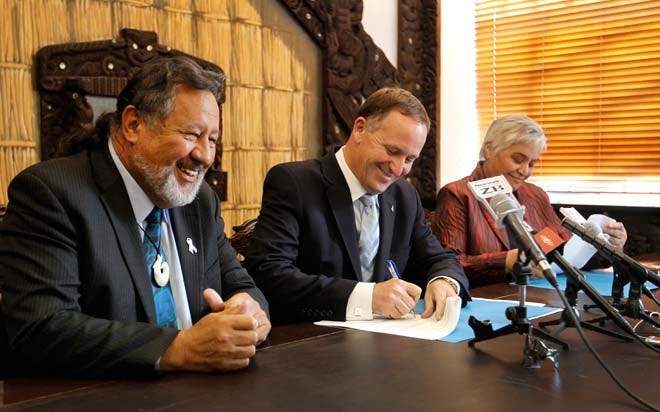
It used to make me so angry to see the way Key used them to give himself more options and the appearance of caring about Māori when the reality was that his commitment was as real as it was to that wee girl, Aroha Ireland, who he plucked from impoverished conditions to take to Waitangi for a photo opportunity and then never contacted again.
I should say that I don’t feel at all like that about current Te Pāti Māori. It will be a cold day in hell before Rawiri Waititi and Debbie Ngarewa-Packer sit alongside David Seymour at Ratana or Christopher Luxon in Cabinet. It’s never going to happen, not in a million years.
There were wounds in the relationship with Labour that needed time, scars with Turia that could not heal. Regardless of that, I have huge admiration for both Turia and Pita Sharples for the work they did in establishing Te Pāti Māori.
Enabling it to become the powerful political force it is today. One that now lies squarely to the left of Labour and wouldn’t touch the coalition parties with a barge pole.
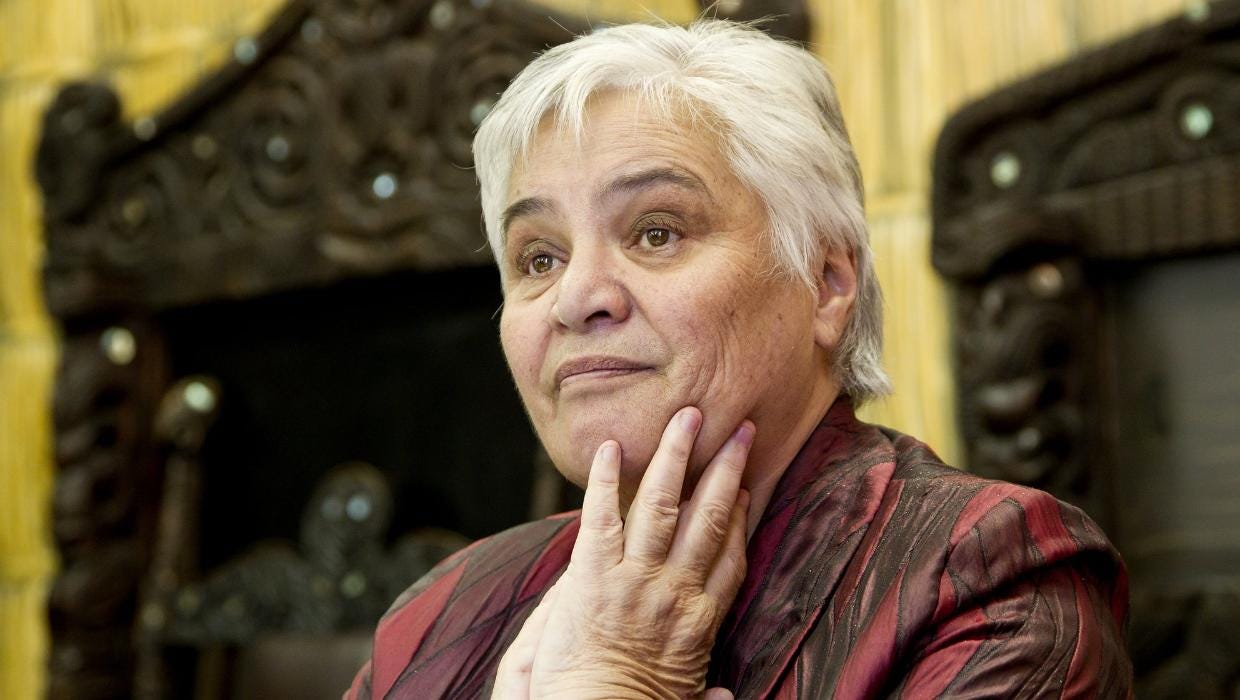
Tariana sadly seemed to retain ill feeling towards the Labour Party, and some of her recent actions made you wonder about her relationship with the National Party.
Three years ago, she declared that she had no confidence in Jacinda Ardern and said that her government's treatment of the protesters at Parliament was an abuse of its powers. She said she sympathised with the protesters and stood with them, not the government.
I thought Jacinda was incredibly patient with those protestors, given how they behaved, and Tariana’s statements were ill-founded and unhelpful.
She even accused Jacinda Ardern of giving a Nazi salute; here is her exchange with RNZ interviewer Karyn Hay from the time, as reported here in the Herald:
The interview took a bizarre turn when Turia recalled footage she claimed to have seen of the PM "almost" performing a Nazi salute.
"I have no confidence in her, I've seen a video of her that was on TV a while ago where she was doing almost a 'Heil Hitler' salute, as a young socialist."
A moment of silence followed the comment, before Hay asked: "Are you serious?"
"I'm deadly serious," Turia responded.
Asked if she believed that Ardern had Nazi sympathies, Turia said: "I certainly believe that she's a socialist."
"Nazi and socialist, the two don't necessarily go hand in hand," Hay responded.
"Well, I don't know so much," Turia said.
She also supported National candidate Harete Hipango, a less than stellar MP even by the standards of that party, at the 2023 election in the electorate of Te Tai Hauāuru.
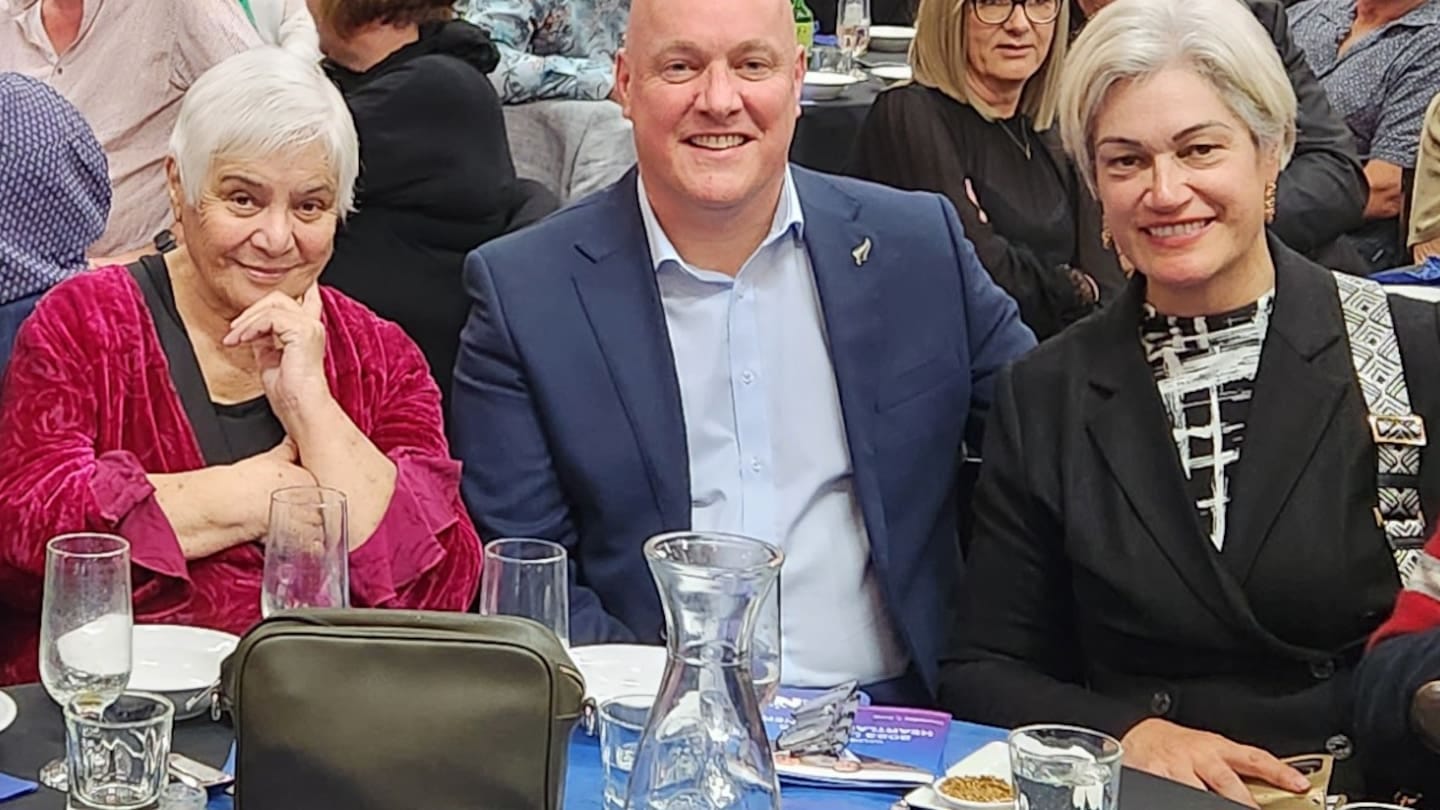
It is fair to say that it is a mixed legacy, as it is with all of us in time.
Turia appeared to hold a grudge against the Labour Party for a long time, but who hasn’t done that? I held one for a long time after Rogernomics and never returned.
Yet it was clear to others of us who had fallen out with that party that Jacinda Ardern was an exceptional leader. I think it is a shame Turia held on to such feelings for so long when the party she aligned herself with within government, and even on occasion subsequently, was so much worse for Māori than anything Labour ever did.
Today, we have a vibrant Māori Party, Te Pāti Māori, and there is much to admire in their words and actions. We can thank Tariana for that and we can ensure that history does not repeat.
This Treaty Principles Bill, like the legislation that saw Tariana depart the Labour Party two decades ago, should never have been introduced. We have Turia to thank for her role in that ongoing fight and the development of a political force.
As we mourn a dedicated and courageous Kiwi, I am grateful for the growth of that movement that seeks to make life better for everyday New Zealanders, Māori or Pakeha, without feeling there is a risk of the people who support them finding out they’ve been sold down the river for some small gains but a whole world of pain.
Rest easy, Tariana Turia. You were of your time, fought for what you believed in, and achieved much. Nobody can really ask or expect more than that.
My thoughts are very much with all who loved Tariana at this sad time. More than anything, she seemed to be a family person, the matriarch I imagine of her whanau, as she was of Te Pāti Māori.
After making my newsletters free over Christmas I had intended to return to paywalled content today, but that didn’t seem appropriate for this.
I appreciate that times are tough. I can see subscribers departing daily, but if you can afford $100 for approximately 300 newsletters this year or $10 a month, a paid subscription to Nick’s Kōrero would greatly help support this work.
If you’re a gold cardholder or on a tight income, you’re most welcome to take advantage of the following discount, which will apply as long as you subscribe.
Please do not purchase a subscription if it will leave you short of money. As my old mate, Karl used to say...
Finally, this newsletter is open to all, so you’re most welcome to share it. Thanks for reading, and have a good one, all you lovely people. 🙂



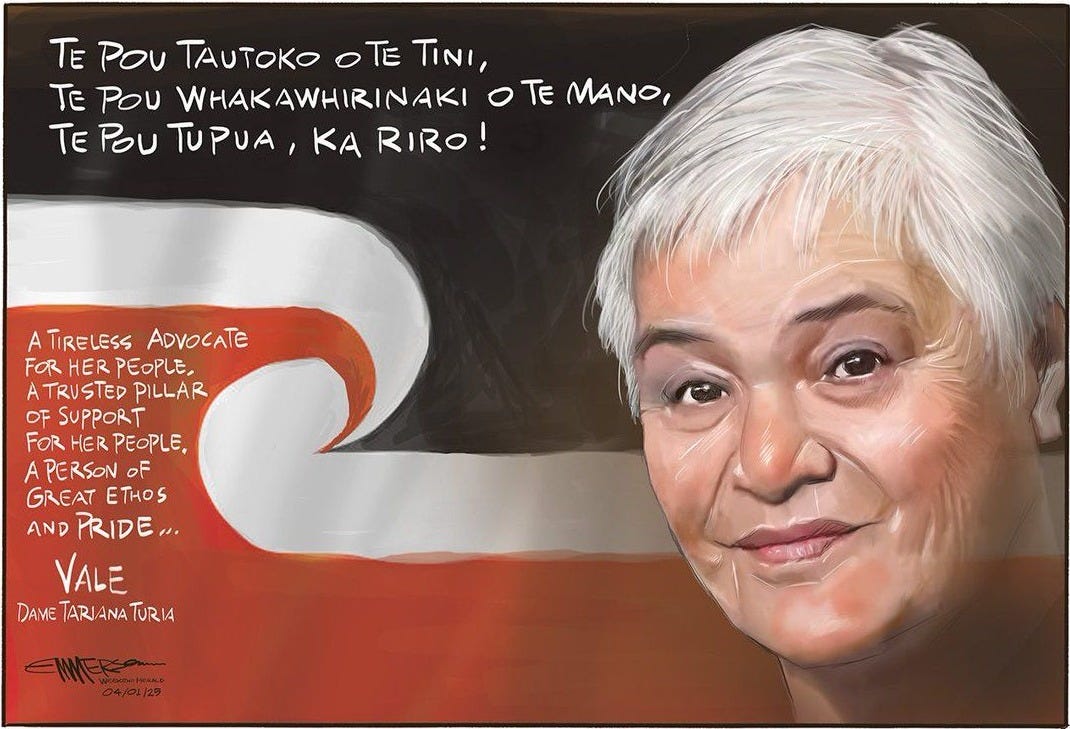

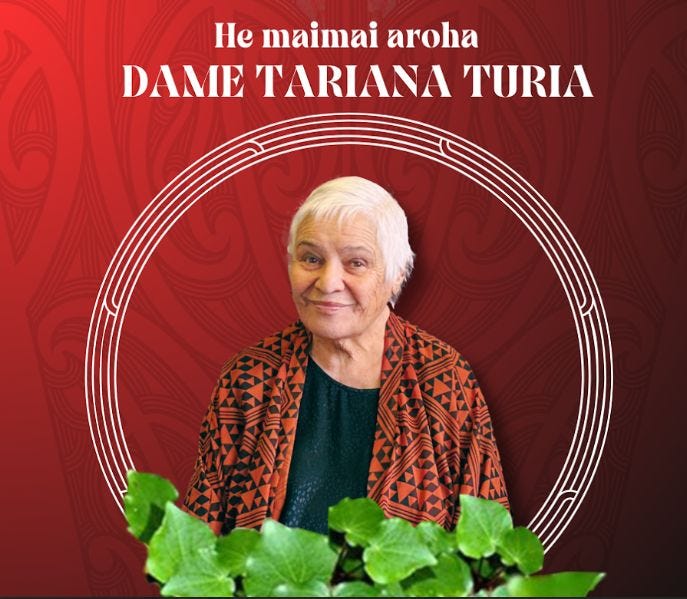
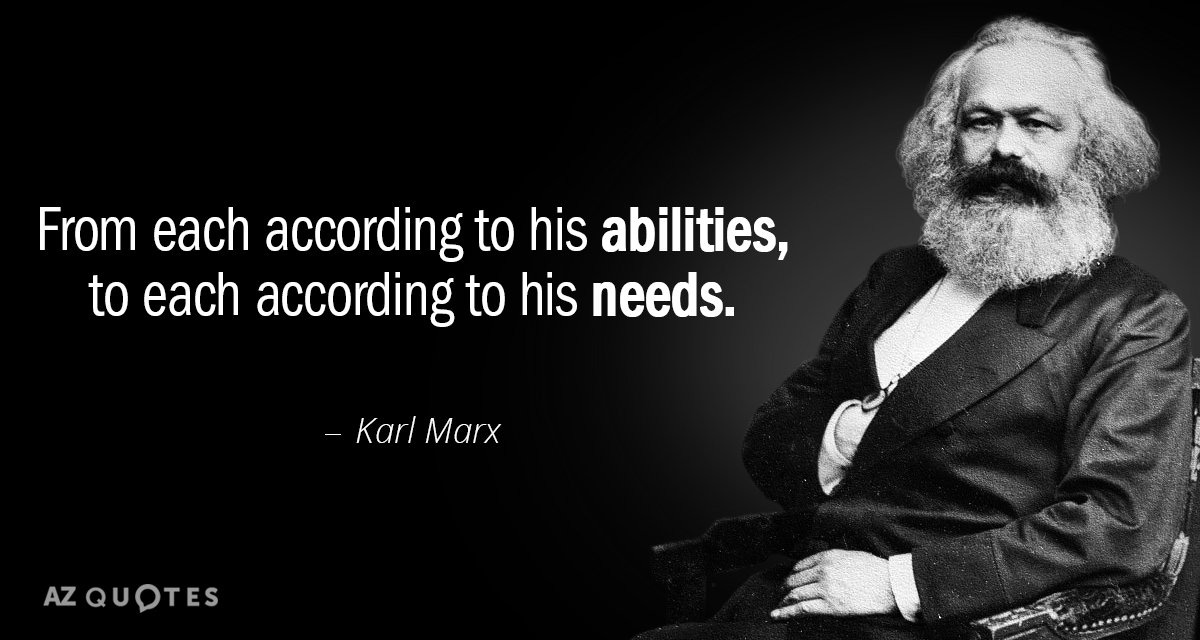
I've kept quiet publicly about Tariana out of respect for her passing and her whanau. But remember she and Pita Sharples (and Flavell) kept John Key in power for nine years. Their support for John Key’s government helped pass a whole lot of shit that impacted on workers, and Maori workers in particular and they voted for budget after budget. They argued it was better to be at the table, but truthfully, they got crumbs. Yes, she was a brave wahine toa. Yes, the Foreshore & Seabed legislation was difficult and you have correctly pointed out the political circumstances, I always remember the poll soon after Brash's Orewa speech where he had zoomed out in front But also remember that many Maori saw TPM's support for National as a betrayal, resulting in a clean sweep of the Maori seats for Labour in 2017. And, all of these years later, here we are with the CoC undoing anything and everything. I agree with you about today's TPM because I think at least they are prepared to acknowledge Labour and the things they have done/are doing and work together. And here we are, all of these years later, still fighting. Somehow it doesn’t feel that different! Well, maybe quite a lot worse. Trying to write my submission on the Treaty Principles Bill, but I agree : Tariana's passing must be treated with the respect she deserved. This is worth a read :
https://e-tangata.co.nz/comment-and-analysis/did-the-maori-electorates-decide-the-2017-election/
It is a great loss. I like the way you have covered the challenges as well as the celebrations. While I admire her for her strength, I was always disappointed she didn't acknowledge Helen Clark's support for her. It was as if the Seashore/Foreshore thing completely overwhelmed her. She was human. Disappointing her alliance with National especially Brash. But in my memory Labour gave her a lot of support (and Helen Clark indeed did that). She had remarkable achievements.